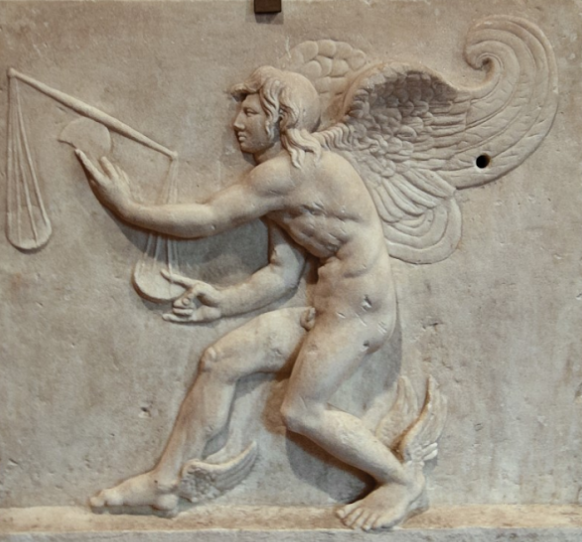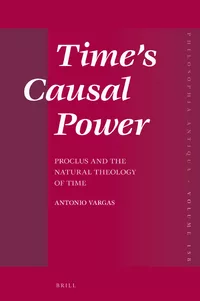
“Kairos (Ancient Greek: καιρός) is an ancient Greek word meaning ‘the right or critical moment’. It is one of two words that the ancient Greeks had for ‘time‘; the other being chronos (χρόνος). Whereas the latter refers to chronological or sequential time, kairos signifies a good or proper time for action. In this sense, while chronos is quantitative, kairos has a qualitative, permanent nature” So says Wikipedia. But in the philosophy of Proclus all time is at once both qualitative and quantitative. Everything that appears has its right moment measured out to it and the uniform flow of time is the measure of all things. In May-June 2024 I will be teaching a course on the dual nature of time in Proclus and its roots in his theology.

This course is a continuation of Time and the Gods – A Course in Platonist Philosophy, which was an introduction to Proclus’ philosophy of time based on my book “Time’s Causal Power: Proclus and the Natural Theology of Time” (Brill, 2021), but which went beyond it in its speculative nature and its entering into dialogue with contemporary philosophies, particularly the Kantian and Phenomenological traditions. Both my book and that course left unresolved the paradox decribed above: on the one hand, for Proclus, time is a uniform flow capable of measuring all things, but on the other it is qualitatively differentiated into distinct kairoi, opportune moments. How can it be both uniform and diverse? This is where this course takes off.
Although this course is a continuation of Time and the Gods, it is not necessary to have been a student in the first course to follow this one, as I will recapitulate the necessary material. Whereas those lessons were based on my published book, this new exposition will mostly be based on the last chapter of my unpublished dissertation, so there will hardly be any overlap with my published work. It will also continue the speculative bent of the last course.
This course will take place over seven classes in seven Sundays in May-June. The classes will be synchronous classes over zoom and will be recorded and made available for the students who wish to go over the material or who were not able to attend. Students will have access not only to recordings of the classes, but also to additional texts for those who wish to read further on their own. These will all be made available in a google drive. Furthermore, for the duration of the course, both in and outside of class, I will be available to answer any questions or comments and also to give feedback on short texts written by students on the subject.
The course will cost R$ 500,00, which will be payable via bank transfer or PayPal. For those paying in dollars and through PayPal this should come to a little over US$ 100,00, given the current exchange rate and the need to cover the PayPal transfer fee. For those interested in also acquiring access to the Google drive of the previous course and tis recorded lessons the cost will be R$ 750,00, which should come to about US$ 150,00.
Here is a short description of each class:
Day One: The Reality of Kairos, Opportune Moments
In this first class, I will present arguments for why there is a distinct phenomenon called the “Kairos” or “opportune moment”, that is, the idea of a time or moment when certain events have to happen or at least are favored to happen (or, conversely, cannot happen or are impeded to happen). This can also be called the existence of “qualitative distinctions” in time: not every hour is like every other hour, but each hour has its own distinctive quality that makes it the hour of certain events and not others. This will be a synthetic presentation of some arguments that were dealt with more at length and in greater depth in the first course “Time and the Gods: An Introduction to Platonist Cosmology”
Second Day: The Reality of Temporal Flow
If in the first class we saw arguments for the need of difference in time, in this one we will consider arguments for the need of sameness, even complete uniformity in temporal flow. Indeed, it is only because the flow of time is practically no change at all, merely the persistence of an identical present, that it can play the role of the change that directs all other changes. This will raise the central problem of the course: how can the flow of time be both uniform and also exhibit different qualities at different times?
Third Day: Time as the Highest Cognitive Life of the World
In this third class, we start by solving the paradox of time’s dual uniform-and-differentiated character by introducing a new thesis about what the flow of time is: the activity of the world’s nous, its capacity for generating insights into eternal things. We will investigate how this capacity must work and compare it to our own ability for insight. This will lead to a distinction between two kinds of nous, a natural kind that is central to all scientific investigation and a supernatural kind that is engaged in moments of inspiration. The latter activity is a rare occurrence for human beings, but it is the state that the soul of the world is always in and it is the ceaseless flow of inspired insight that is the flow of time. Because it is uniform in its source and yet differentiated in the soul, time is both uniform and differentiated
Fourth Day: The Divinity of the World and its Union with All the Gods.
Part of what distinguishes inspired insight is that it is not just a cognitive activity, but one that employs our will and our very self, the unity of the soul. This is our ability to identify as an “I” and to enjoy union with the gods. The constant state of inspiration of the world is due to the fact that it is itself a god and is united with all the other gods. In this class we will study the concepts of one of the soul, divine unity and unity with and amongst the gods.
Fifth Day: The Presence of the Gods in the World: Signatures and Forms
If the flow of time unfolds the union of the World with all the gods, then what is known in the successive inspired insights of the world is the signature of each god, the mark of its presence amongst beings. In this class we will study the notion of a divine signature and how it relates to the more common notion of form. It is signatures, and not forms, that ultimately connect the heavenly bodies, that indicate time, and terrestrial phenomena.
Sixth Day: The Flow of Time as the Unfolding of the Divine Number
In this class we will synthesize the results of the previous classes by looking at how Proclus describes the eternal order of Time as a nous that is modeled after Number itself, which is the union of all the distinct divine signatures, indeed it is the divinity that distributes the distinct divine signatures to each of the gods. The flow of time is thus nothing but the blessedness of the world soul, as the soul of a god that is always in a state of union with the gods.
Seventh Day: The Ascent and the Descent of the Soul in Time
In this last class, we will consider the ethical implications of Proclus’ theory of time. In particular, we will see that he takes each human soul to belong to a certain god and to be imprinted with a certain divine signature and to follow a certain temporal cycle, such that the salvation of souls involves their restoration to following the train of their god in the heavens.